When her daughter couldn't get pregnant, a 51-year-old mom volunteered to be her surrogate
Anneta Konstantinides

- Breanna Lockwood, 29, went through hundreds of IVF injections, seven surgical procedures, and two miscarriages as she struggled with fertility issues.
- After Lockwood's second miscarriage, her mother Julie Loving, 51, offered to be her surrogate.
- Loving found out she was pregnant in March, just before the country went into lockdown.
- Insider spoke with Loving and Lockwood about their "unique and special" surrogacy journey together.
1,311 days. 476 injections. 19 frozen embryos. Seven surgical procedures. Two miscarriages. One ectopic pregnancy. Countless tears.
This has been Breanna Lockwood's world for the last four years.
Lockwood, 29, has always dreamed of becoming a mother. But she never thought that the person who would help that dream come true would be her own mom.
Julie Loving, 51, is carrying her daughter's first child after Lockwood's years of fertility struggles. Now, the pair are sharing their incredible surrogacy story with Insider, hoping to inspire others.
Breanna Lockwood and her husband Aaron began trying for a baby shortly after they tied the knot in 2016.
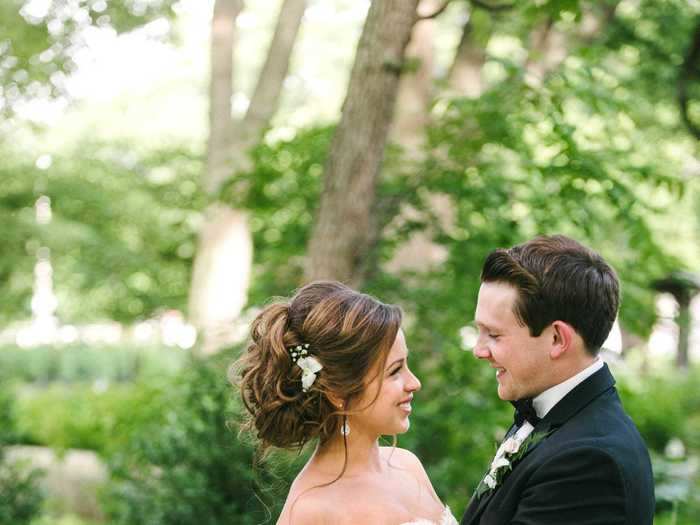
The high-school sweethearts, who live in Chicago, decided to start trying right away after Lockwood learned that her grandfather had terminal cancer.
"One of the things that he had always talked about was seeing his great-grandchild," Lockwood told Insider. "So we decided to move our plans forward."
But getting pregnant turned out to be much harder than Lockwood had expected.
"Initially when you start trying, you think it's just going to happen right away," she said. "That's what you're taught. You prevent, prevent, prevent, and then — it just kind of happens. When it wasn't happening after a couple of months, I started to get concerned."
After a year of trying to conceive on their own, the couple had a consultation with Dr. Brian Kaplan, a fertility specialist at Fertility Centers of Illinois.
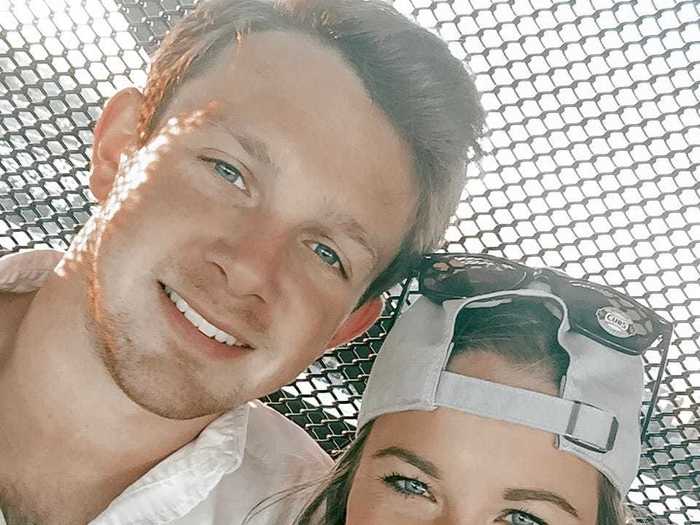
"He was pretty optimistic from the beginning," Lockwood said. "We did a couple of different fertility treatment options and then moved to IVF pretty quickly."
"The really hard part of fertility treatment is you don't just walk in and they get you pregnant," she added. "It can take months to attempt even one round of IVF."
As the years went by, Lockwood began skipping social gatherings. She wanted to avoid the inevitable question: "When are you going to have kids already?"
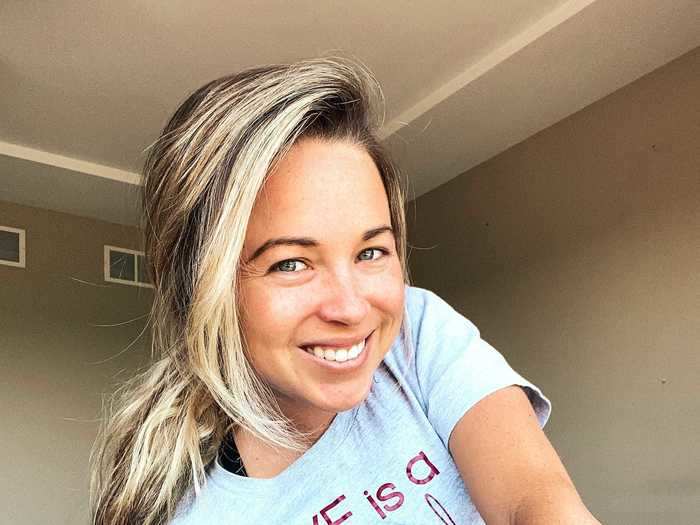
Lockwood said it was also hard to cope with so much loss as she watched her friends having their first, second, or even third babies.
"I was happy for them, but it felt like I wasn't getting anywhere on my own journey," she said. "It made the days really hard. You start to grieve your future a little bit, because it might not turn out how you planned. It was easier sometimes for me not to talk about it, but it was the elephant in the room."
Loving said she "felt really helpless" as she watched her daughter struggle.
"As parents, you want to help your kids, you want to fix it, and it was something we could not fix," she added. "It was really, really hard."
It was after Lockwood's first miscarriage that her mom Julie Loving began to think about becoming her daughter's surrogate.
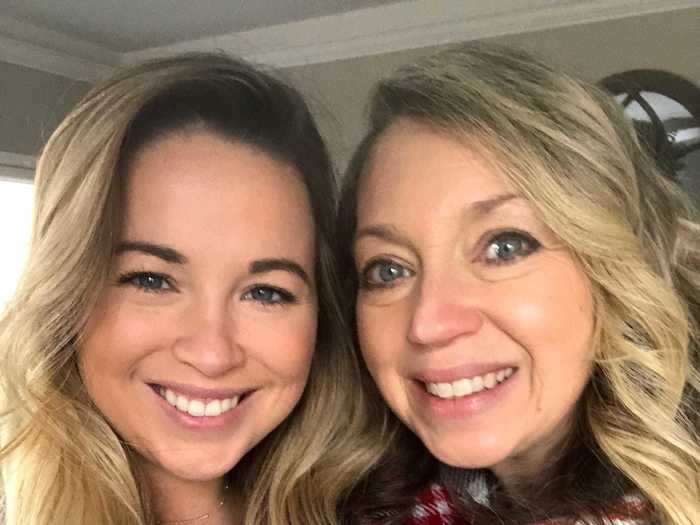
"I wasn't thinking it would come to that, but just as a plan C — a backup plan," Loving said. "After she had lost the twins is when it got a little more serious."
Lockwood was almost into her second trimester with twins in December 2018 when she received the devastating news during a routine ultrasound appointment.
"We both went into the appointment thinking everything was going to be fine," Loving said. "So to hear there was no heartbeat, it was just devastating. You almost think you're in a nightmare."
"I just really broke down," Lockwood said. "Anytime you get that far in a pregnancy, you let your guard down a little bit and get hopeful and start thinking about that baby more. It was just one step forward and five steps back."
After the miscarriage, it was recommended that Lockwood undergo a dilation and curettage (D&C). But the procedure led to rare complications that left her with permanent infertility.
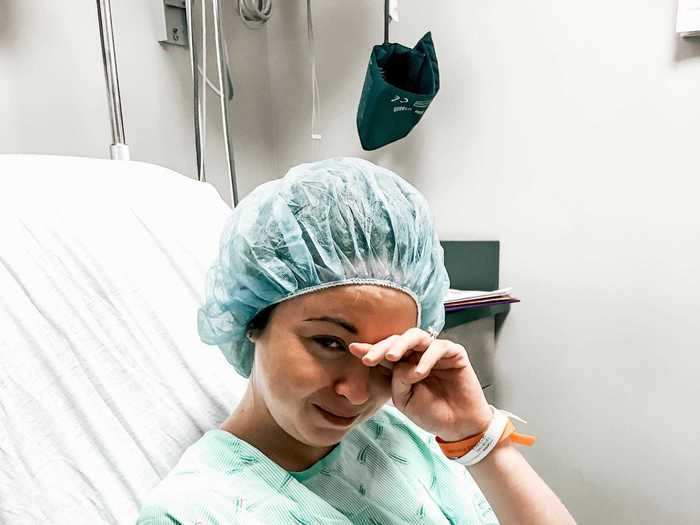
Lockwood was diagnosed with Asherman's syndrome, an acquired gynecological disorder caused by uterine scarring.
"When there's scar tissue, it doesn't allow for a baby to implant and grow," Lockwood said. "I was in denial for a long time. I saw a couple of specialists, we did a couple of surgeries to try and repair the uterus, but it was just found to be unsuccessful. I was no longer getting pregnant, even with IVF."
As Lockwood and her husband began looking into other options, Loving decided to send her daughter a text: "I really want to be your surrogate."
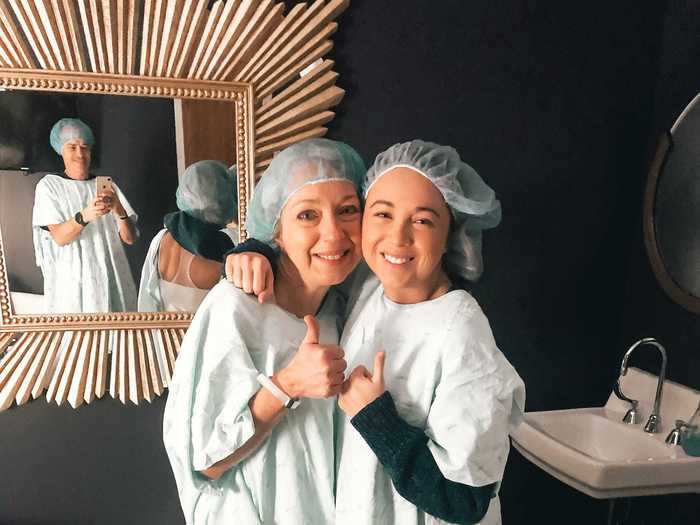
"I thought she was crazy," Lockwood said. "I didn't think it was even possible. I just read it and put my phone away. I didn't want to get my hopes up and get my heart set on something."
But Loving was persistent.
"I really felt like I had a good shot," she said. "I've never been on any kind of medications and I had really easy pregnancies with my two kids, so I felt like I would be a good candidate. And I also want to be a grandma as bad as Breanna wants to be a mom. So it was really easy for me to want to do this."
Lockwood didn't even entertain the idea, though, until she stumbled across an article about a 61-year-old mother who served as a surrogate for her son and his husband.
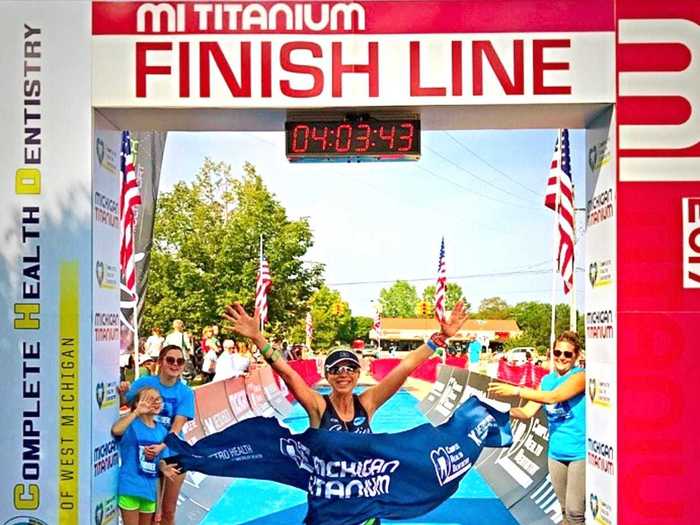
"I started to read the article and I was like, wait a minute, this might be a possibility," Lockwood said.
So Lockwood brought Loving to one of her appointments with Dr. Kaplan, who already knew that her mother was a two-time Boston Marathon runner and "super into health and fitness."
"When he met her, I could see him really start to think about it," Lockwood said. "He wasn't saying yes right away, but he was nodding and thinking."
Kaplan agreed to look further into a potential surrogacy if Loving was cleared by her primary care physician and OB-GYN, as well as a psychologist and maternal-fetal medicine specialist. She also had to undergo numerous tests and panels of blood work.
After three months, the tests were finally done and Loving had passed with flying colors. Kaplan approved the surrogacy.
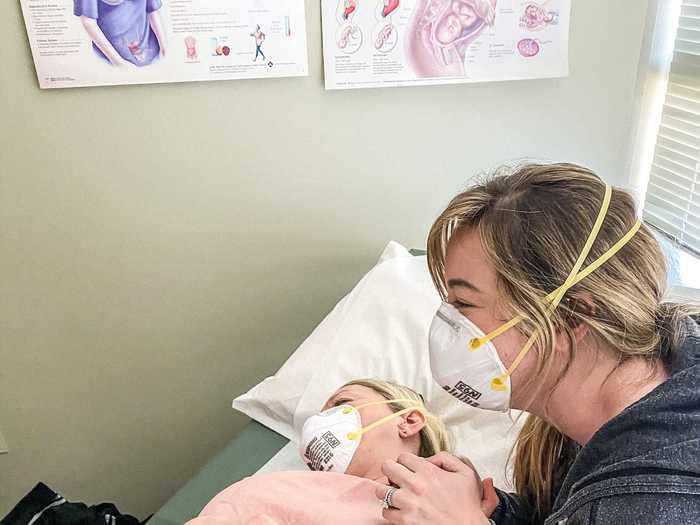
"This is obviously a very unique scenario, and was done after very careful personalized medical, psychological, and ethical considerations," Kaplan told Insider, noting that he had never before heard of a mother serving as a surrogate for her daughter.
"Julie had an extensive work up and was considered uniquely healthy, which included completing marathons in her 40s," he added.
Lockwood still feared that the surrogacy wouldn't work, but she knew they needed to try.
"We're not big gamblers, but this is definitely the biggest gamble we've ever taken," she said. "We wouldn't be able to walk away and say we did everything we could if we didn't take the risk of trying."
Kaplan performed the embryo transfer in February. Two weeks later, Loving discovered she was pregnant.
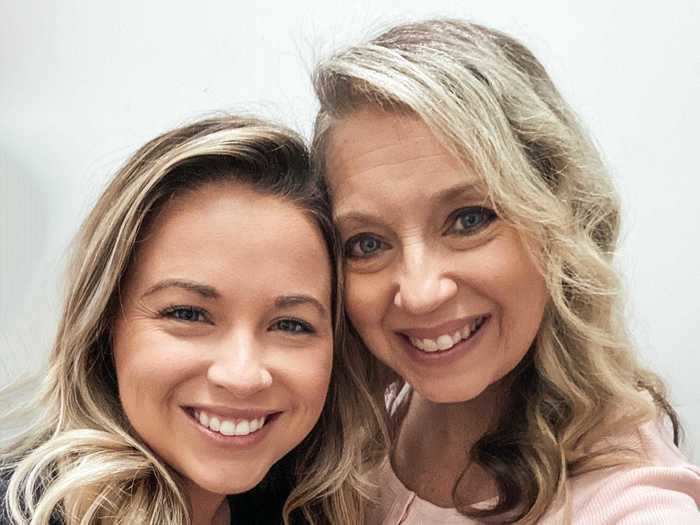
"I was excited, but we were also really cautious," Loving said. "We knew we still had a lot of obstacles."
Loving said that carrying her grandchild has been a "pretty similar" experience to her past pregnancies — with the addition of a pandemic.
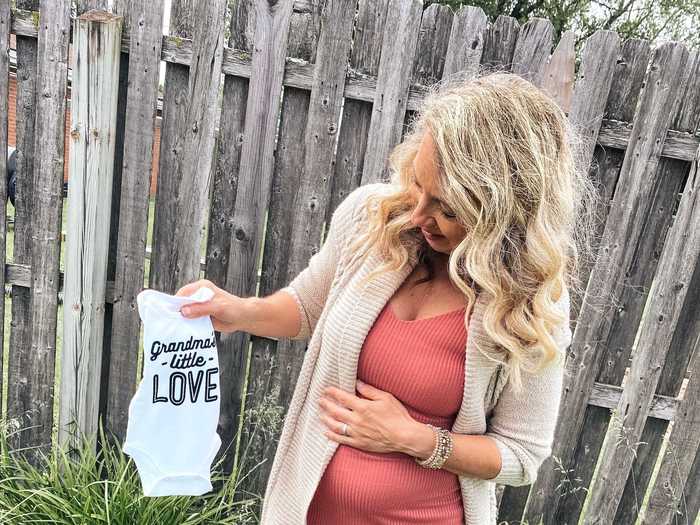
"I'm probably a little more tired, more fatigued," she said. "But everything else has been about the same. I haven't really gone anywhere, and that part has made it not quite as enjoyable. But I'm really grateful. I feel like everything has gone really smooth and I've felt really good."
And Lockwood is finally letting herself get excited after Loving had a successful 20-week anatomy scan.
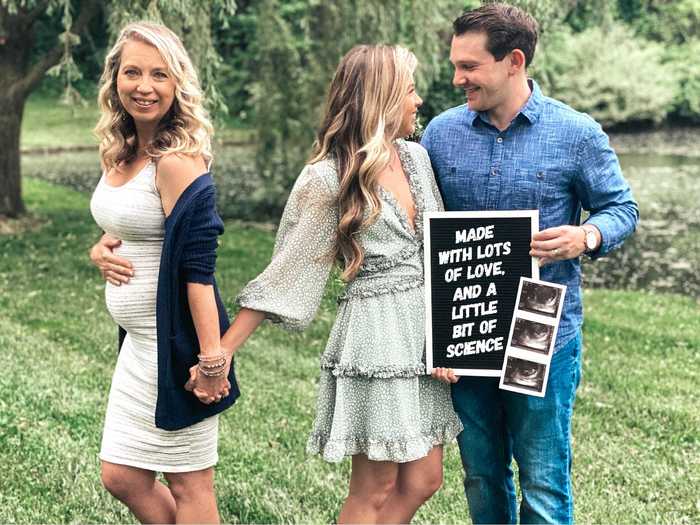
"That is just a bit of a sigh of relief," Lockwood said. "When you get to walk out of there and everything looks textbook."
"I think I'll always be a little nervous around every corner, but also appreciate every milestone as much as I can."
As the November due date nears, Lockwood said it has been "really unique and special" to go through this experience with her mother.
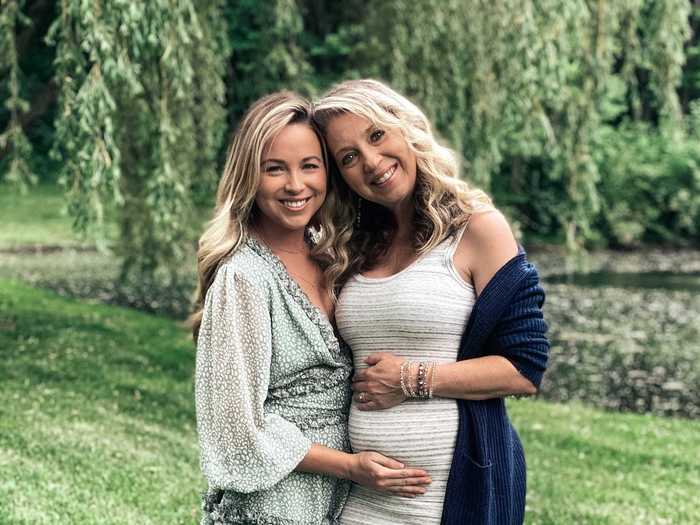
"I know most women who go through surrogacy, sometimes they're not even in the same state," Lockwood said. "So I feel so fortunate to be 20 minutes away. For a while we were living together and I was right down the hall."
"It's been even more exciting now that I've been able to feel the baby kick," she added. "And buying her maternity clothes and doing anything I can to help."
Now Lockwood and Loving are sharing their journey with more than 52,000 Instagram followers.

Lockwood had created an Instagram account last year to communicate with other women who were going through IVF. But when it was time to announce the pregnancy, she decided she was ready to go public.
"Going through fertility treatment can be isolating and lonely," she said. "When I was going through the thick of it, I looked through the good stories, the hope, the light — something to keep you going. And I hope that I can do that for someone else."
Lockwood said she has since received an outpouring of support, and has been touched by the dozens of women who have shared their own stories with her.
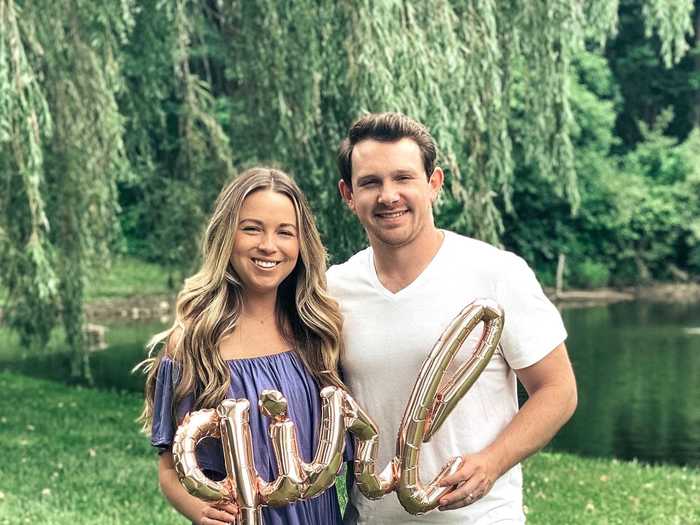
"I was shocked," she said. "I had no idea it was going to take off with that magnitude. It was really eye-opening to see women all over the world who are going through similar things."
"If I just help even one person, then I know that this was meant to happen."
Lockwood recently found out she's expecting a baby girl. Now, she and Loving are counting down the days until they can welcome her into the world.
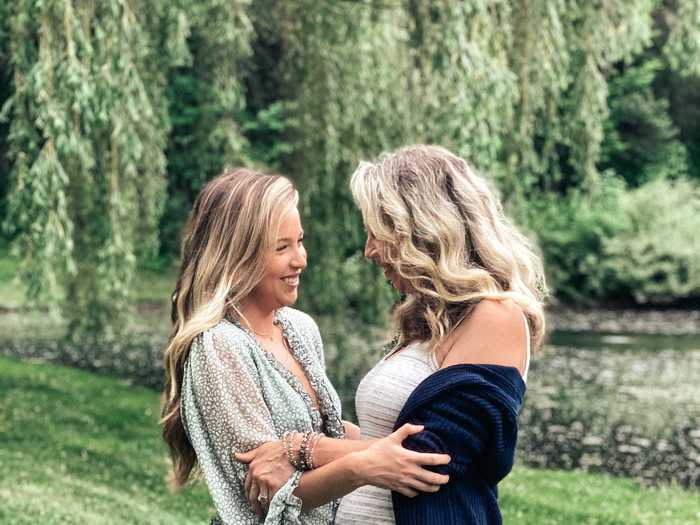
"I can't wait to see her and see what she's going to look like," Lockwood said. "It's going to be a surreal moment."
"I can't wait to see Breanna's face when she's here," Loving said. "And see her holding her."
- Read more:
- 22 celebrity parents who welcomed babies via surrogates
- A woman shared a photo of her negative pregnancy test with a heartbreaking message after 1,200 days of struggling to conceive
- A baby boy is the first person born using 'in vitro maturation' because his mother couldn't get hormone injections
- How to get pregnant: A guide to help increase your chances
READ MORE ARTICLES ON
Popular Right Now
Popular Keywords
Advertisement